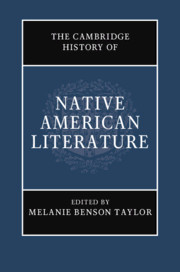Book contents
- The Cambridge History of Native American Literature
- The Cambridge History of Native American Literature
- Copyright page
- Contents
- Figures
- Contributors
- Introduction: What Was Native American Literature?
- Part I Traces and Removals (Pre-1870s)
- Part II Assimilation and Modernity (1879–1967)
- 7 The Multiplicity of Early American Indian Poetry
- 8 Native American Literature in the 1930s
- 9 Black-Indian Literature under Jim Crow
- 10 Transatlantic Modernity and Native Performance
- 11 American Indian Literature and Post-Revolutionary Mexico
- 12 I Kū Mau Mau (Standing Together): Native Hawaiian Literary Politics
- 13 Native Women’s Writing and Law
- Part III Native American Renaissance (Post-1960s)
- Part IV Visions and Revisions: 21st-Century Prospects
- Index
- References
7 - The Multiplicity of Early American Indian Poetry
from Part II - Assimilation and Modernity (1879–1967)
Published online by Cambridge University Press: 18 September 2020
- The Cambridge History of Native American Literature
- The Cambridge History of Native American Literature
- Copyright page
- Contents
- Figures
- Contributors
- Introduction: What Was Native American Literature?
- Part I Traces and Removals (Pre-1870s)
- Part II Assimilation and Modernity (1879–1967)
- 7 The Multiplicity of Early American Indian Poetry
- 8 Native American Literature in the 1930s
- 9 Black-Indian Literature under Jim Crow
- 10 Transatlantic Modernity and Native Performance
- 11 American Indian Literature and Post-Revolutionary Mexico
- 12 I Kū Mau Mau (Standing Together): Native Hawaiian Literary Politics
- 13 Native Women’s Writing and Law
- Part III Native American Renaissance (Post-1960s)
- Part IV Visions and Revisions: 21st-Century Prospects
- Index
- References
Summary
This essay introduces the understudied archive of early Native American poetry by reading a series of little-known poems that face the routines of ordinary life, including the observation of nature, scientific curiosity, complicity with Manifest Destiny, work, curiosity, resistance to and complicity with ideologies that exoticize Indigenous peoples, sexual anxiety, and self-critical reflection on environmental devastation. These poems speak with a shifting blend of irony, doubt, pride, political resistance or complacency, and resentment or embrace of stereotypes, while each poem also models how lyrical cultural interpretation can confront internal contradictions and competing impulses. In these ways, poetry’s capacity to represent intense literacy moves beyond colonialist, demeaning views of American Indian cultures and histories and invites us to see American Indians not only as topics of literary history but also as its creators.
- Type
- Chapter
- Information
- The Cambridge History of Native American Literature , pp. 131 - 148Publisher: Cambridge University PressPrint publication year: 2020

